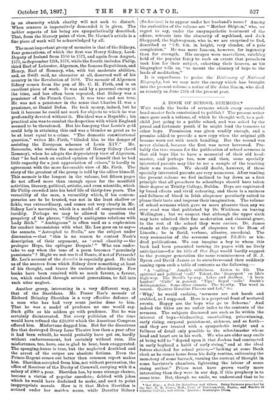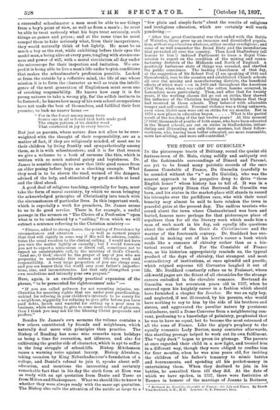A BOOK OF SCHOOL SERMONS.* WHO reads the books of
sermons which every successful head-master feels constrained to publish ? The present writer once gave such a volume, of which he thought well, to a god- child just going to a public school, and was asked by the proud and fortunate youth if he might lend the treasure to
other boys. Permission was given readily enough, and a promise added to provide a new copy when the original gift
became worn out with much handling. But the second was never claimed, because the first was never borrowed. Pro- bably the true reason for the publication of school sermons is that old boys like to have a memorial of their old head- master, and perhaps too, now and then, some specially interested parents may like to see a sample of the teaching their sons receive. We should doubt, however, if these specially interested parents are very numerous. After reading the present volume we feel inclined to lay down as a first principle that all preachers to schoolboys should have taken their degree at Trinity College, Dublin. Boys are captivated by broad effects and vivid colouring, and there is a raciness and fullness of blood in Irish eloquence peculiarly suited to please their taste and impress their imagination. The volume of school sermons which gave us more pleasure than any we ever read was that published by Dr. Wickham on leaving Wellington ; but we suspect that although the upper sixth may have admired their fine moderation and classical grace, to the rest of the school they were caviare. Dr. James stands at the opposite pole of eloquence to the Dean of Lincoln ; he is florid, verbose, allusive, anecdotal. The very summaries of the sermons suggest Tit-Bits or kin- dred publications. We can imagine a boy to whom this book had been presented turning its pages with no lively anticipation—for its title of Our Boys would hardly suggest to the younger generation the same reminiscences of H. J. Byron and David James as to ourselves—and then suddenly coming upon such a table of contents as the following :—
"A calling.' Jonah's wilfulness. Listen to Eli. The spiritual and political 'call.' Talent, the • fingerpost ' on life's high-way. The Devil's by-way. Likes and dislikes. A born
banker.' 'Calls' in general. Tips.' Royal calls.' Smith's delinquencies. Some other sinners. The faculty. The word in season. Quintus Horatius Fla.ccus and Lot," tkc.
'Why,' he would exclaim, sermons are not harsh and crabbed, as I supposed. Here is a perpetual feast of nectared sweets. Happy are the boys who go to Schorne.' And indeed the titles are no unfair index to the contents of the
sermons. The subjects discussed are such as lie within the interest of boys—birdnesting, snowballing, prizewinning, early rising, corporal punishment, sickness, and so forth— and they are treated with a sympathetic insight and a fullness of detail only possible to the schoolmaster whose
head and heart are in his work. We who are older may smile at being told to "depend upon it that Joshua had contracted in early boyhood a habit of early rising," and at the ideal future sketched for school prizes,—" looking at some Bank clerk as he comes home from his daily routine, enlivening the monotony of some barrack, turning the current of thought in some barrister's chambers, lightening the labour of some rising author." Prizes must have grown vastly more interesting than they were in our day, if this prophecy is to come true. But, though we smile, we understand that to be
* Our Boys : a Book for Schoolboys and Others. Being Sermons preached by the Rev. B. B. James, D.D., Vicar of Northmarsten, Smoke., sad Warden of behorne College; and others. London : Roxburgh° Pres%
a successful schoolmaster a man must be able to see things from a boy's point of view, as well as from a man's ; he must be able to treat seriously what his boys treat seriously, such things as games and prizes; and at the same time he must compel them to take seriously what, from their inexperience, they would naturally think of but lightly. He must be as much a boy as the rest, while exhibiting before their eyes the model man, a being alive at every pore, tingling with strenuous- ness and power of will, with a moral circulation all day under the microscope for their inspection and imitation. We sus- pect it is being able to live a man's life under boyish conditions that makes the schoolmaster's profession possible. Looked at from the outside by a reflective mind, the life of one whose mission it is to form the character as well as train the intelli- gence of the next generation of Englishmen must seem one of crushing responsibility. He knows how easy it is for young natures to take a wrong ply, for' the selfish instincts to be fostered ; he knows how many of his own school-companions have not made the best of themselves, and fulfilled their first promise, to look no nearer home :—
'For in the forest among many trees Scarce one in all is found that hath made good The virgin pattern of its slender wood That courtesied in joy to every breeze."
But just as parents, whom nature does not allow to be over- weighted with the thought of their responsibility, are as a matter of fact, if they are religiously minded, of most use to their children by living frankly and sympathetically among them, so it is with schoolmasters; and it is for that reason we give a welcome to a book of sermons like this, which is written with so much natural gaiety and boyishness. Dr. James is sensible enough to know that little good comes from an elder posing before boys as a shocking example. What they need is to be shown the road, warned of the dangers, advised of the help, and stimulated by good models at hand and the ideal ahead.
A good deal of religious teaching, especially for boys, must take the form of moral casuistry, by which we mean bringing the acknowledged principles of Christianity into touch with the circumstances of particular lives. In this important work, which is especially a work for preachers, Dr. James seems to us to do good service. There is, for example, a useful passage in the sermon on "The Choice of a Profession" upon what is to be understood by a "calling," from which we will extract a sentence referring to the Christian ministry :—
"Fitness, added to strong desire, the pointing of Providence by circumstances and situation as well as earnest prayer that God will signify in some way if His will be adverse, consti- tutes the usual vocation to the clerical calling. I would not have you view the matter lightly or casually ; but I would forewarn you not to expect a miraculous or direct call, sometimes not to expect an unmistakable call, to the ministry of God's Church. 'Lead me, 0 God,' should be the prayer of any of you who are proposing to undertake this solemn and life-long work and responsibility. A very large proportion of you are clergy sons, and you see nearer than the world sees your father's imperfec- tions, sins, and inconsistencies. Let that only strengthen your own resolutions and intensify your own prayers."
Here, again, is an excellently practical expansion of the phrase, "to be persecuted for righteousness' sake" :—
"If you are called poltroon for not resenting injuries, un- 0hristian for asserting rights that are under your guardianship, unkind for refusing in your children's interests to be surety for a neighbour, niggardly for refusing to give gifts before you have paid debts, lavish and wasteful for setting up a poor man in business, while refusing to give to some mere scheme of pleasure, then I think you may ask for the blessing Christ propounds and proffers."
Besides Dr. James's own sermons the volume contains a few others contributed by friends and neighbours, which naturally deal more with principles than practice. The Bishop of Reading has some wise remarks upon holidays as being a time for recreation, not idleness, and also for cultivating the gentler side of character, which is apt to suffer in the long straggle of school-life. Bishop Mitchenson raises a warning voice against luxury. Bishop Abraham, taking occasion by King Nebuchadnezzar's foundation of a college, and Daniel's refusal to join it, speaks about self- education, and mentions the interesting and certainly remarkable fact that in his day the sixth form at Eton was as ready with an apt quotation from Dante and Tam as from Milton and Shakespeare. What we should like to know is whether they were always ready with the same apt quotation. The Bishop also calls the attention of the public at large to a "few plain and simple facts" about the results of religions and irreligious education, which are certainly well worth pondering :—
"After the great Continental war that ended with the Battle of Waterloo, there grew up an immense and dissatisfied popula- tion, without any education whatever, either secular orreligious ; and some of us well remember the Bread Riots and the incendiarism that prevailed all over the country. Then Lord Shaftesbury (all honour to him !) induced Parliament to issue a Royal Com- mission to report on the condition of the mining and manu- facturing districts of the Midlands and North of England. A positively barbarous state of things was revealed, and startled. the public conscience. The leading Churchmen of that day, at the suggestion of Sir Robert Peel (I am speaking of 1845 and thereabouts), rose to the occasion and established Church schools all over the mining and manufacturing districts, the beneficial effects of which were seen in 1860 and throughout the American Civil War, when what was called the cotton famine occurred, in Lancashire more particularly. Then, and after that for twenty years, if the working classes did go out on strike, they showed the influence of the Christian teaching and kindness that they had received in those schools. They behaved with admirable temper and self-control. Personal violence was a thing unknown, even when 50,000 men were out on strike for six months. But in
1870 a new phase in education began What is the partial result of the teaching of the last twelve years ? At this moment [?18923 thousands of youths of both sexes, who have been educated in the Board schools, are out on strike in Staffordshire, intimi- dating and ill-treating not only their masters, but their fellow- workmen, who, having been better educated, are more reasonable, more law-abiding, and more self-controlled."







































 Previous page
Previous page